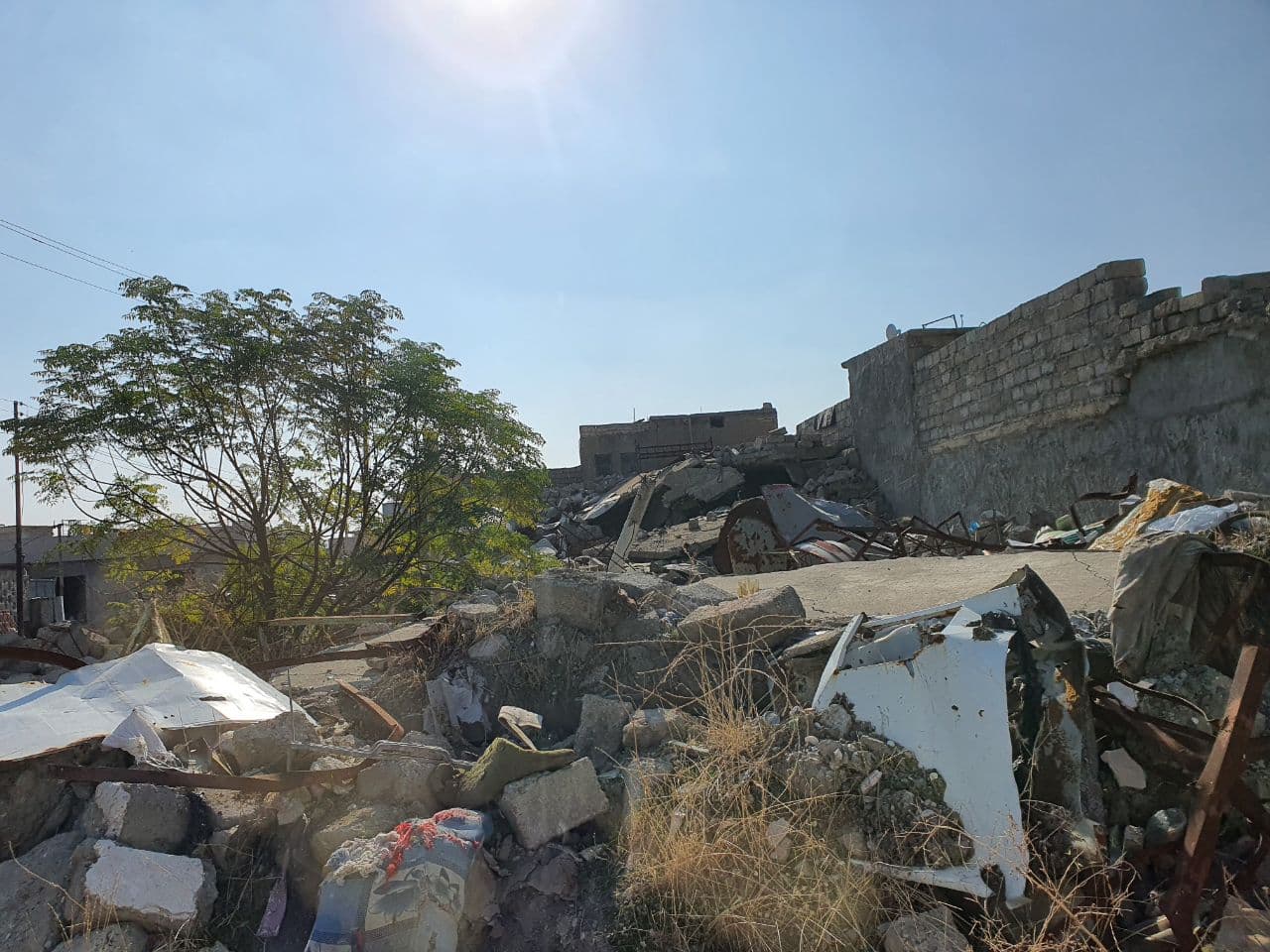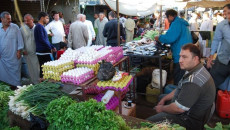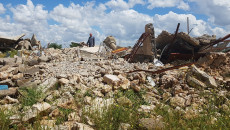“It is impossible to live in this ruin, and those who do not have money can’t rebuild their houses. I wish they had allowed me to stay and I didn't return to this destruction,” Ashraf Jameel, a recently-returned IDP from a camp in Kirkuk, keeps lamenting.
Pointing at the rubble of what was once his home, 35-year-old Jameel told KirkukNow: “I am supposed to live here. How much will I need to rebuild this ruin, while I have to find a job to provide for a family of five?”
“Despite all the hardships, the tent at the camp in which I used to live in was much better than this despair. I can’t afford rebuilding my house, nor rent one to shelter us as long as I have no source of income.”
The al-Eyadhia subdistrict is part of the Turkmen-majority Tal Afar district in west Nineveh province. It is located 13 km north of the district’s centre. ISIS took control of it in June 2014 and forces of the Federal Government retook it in August 2017. It was declared a disaster-stricken area by the now-dissolved Nineveh Administration Council.
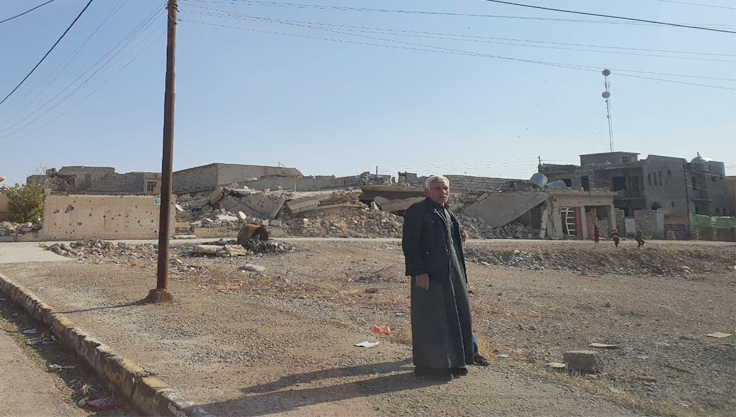
A local official from the subdistrict told KirkukNow: “290 families have returned in the last two weeks of November 2020 to the district from the displacement camps in Kirkuk.”
1694 families (8,490 individuals) out of a total of 3,120 displaced families from the subdistrict have returned since it was retaken in August 2017, the source, who wished to remain unnamed, added.
“573 houses have been damaged to an extent they are no longer suitable for occupation. In addition, tens of other houses are partially damaged.”
573 houses have been damaged to an extent they are no longer suitable for occupation
“International organizations have started aiding the returning families by providing sums of money according to the size of each family determined by the [government] ration cards, in addition to providing cash in exchange for work. They are also planning to provide urgent relief assistance, as we have been informed. While organizations specialized in mine clearance have intensified their work and carried out a wide awareness campaign to reduce the risk of remnants of war.”
On 23 November 2020, the ‘Security Media Cell’ of the Federal Government forces announced that 17 leftover IEDs from ISIS were found and detonated at the outskirts of al-Eyadhia.
A commander from the West Nineveh Operation Command told KirkukNow: “209 families of the total families that have recently returned to al-Eyadhia… have been screened for security after registering at the National Security Directorate. The remaining families will be screened as well.”
Omar Adil, another recently-returned IDP, said: “Electricity feed is provided two hours every six or eight hours. And drinking water doesn’t reach some neighbourhoods except a few hours in the week. The entire subdistrict depends on an old medical centre. There is no fuel for the returned families in this harsh cold weather. Rubble and waste are everywhere. And on top of it all, there are no job opportunities.”
“I wasn’t surprised about conditions here, as we were in contact with our relatives. But we were compelled to return.”
“We currently live with four other families in one house. My eight-member family live in one room which is not bigger than four by four metres.”
Electricity feed is provided two hours every six or eight hours. And drinking water doesn’t reach some neighbourhoods except a few hours in the week
The head of the Tal Afar Office of the Ministry Immigration and Displacement, abul-Ghafour al-Bayati, told KirkukNow: “The ministry has provided free transportation for the returnees and their possessions from the Yahyawa Camp to al-Eyadhia. Our office has also started handling their applications to get the $1.5 million Iraqi Dinar grant from the government, in addition to other benefits like food aid.”
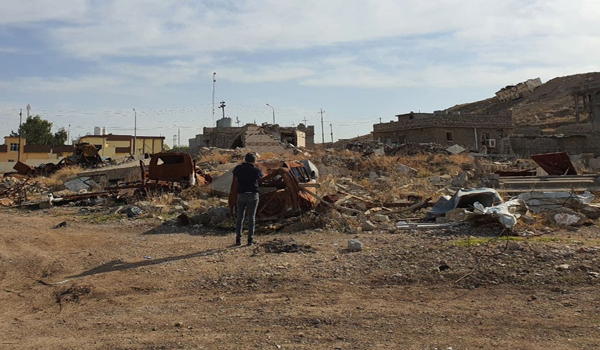
The Yahyawa Camp in Kirkuk was closed late last year by the Ministry of Immigration and Displacement after sending back the IDPs to their home regions. The camp was hosting 335 families, most of whom were from the Tal Afar district in Nineveh.
Another returnee, Sa’d Fakhri, said: “We hope those whose house were damaged to be compensated, and for the returning grant to be distributed as quickly as possible, as the returnee families mostly have limited income or none at all.”
“Returning was inevitable, but the destruction of our homes was an obstacle. As you can see, living in these ruins is impossible, and those who don’t have money are not able to rebuild their homes.”
living in these ruins is impossible, and those who don’t have money, can’t rebuilt their homes
In a report issued on 27 November 2020, the Save the Children organization said: “Some of the 303 families who have been moved out of the Yahyawa camp have arrived in Mosul, Eiyadiah [al-Eyadhia] and Tal Afar in Ninewa governorate, only to discover there was no safe shelter”
“Save the Children teams spoke to parents who had been forced to leave the camps. They told harrowing accounts of finding unexploded bombs and corpses in buildings and under rubble in the areas they now reside in,” the aid organization wrote in its report.
Like all the residents of al-Eyadhia, Ashraf Jameel is waiting to be compensated for his destroyed house, or for a governmental or non-governmental entity to come and rebuild it for him.

